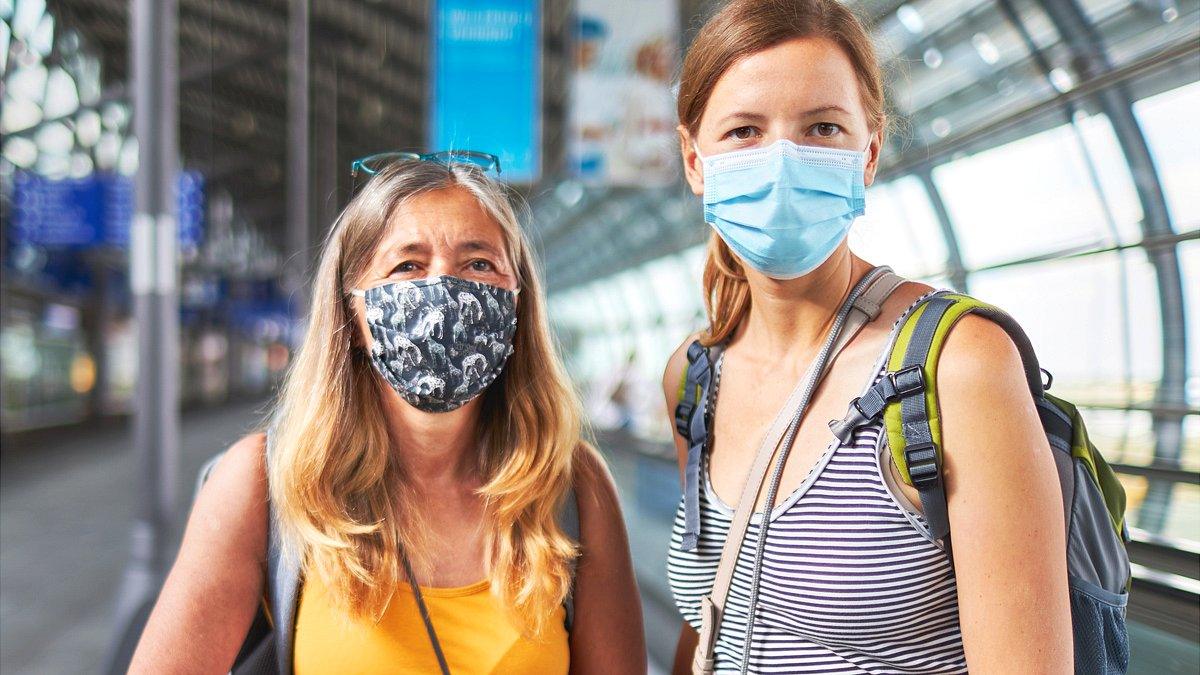Coronavirus holidays: You're finally abroad, but was it worth it?
- Published
Queuing to get a socially-distanced sunbathing spot on the beach. Wearing your face mask to the hotel bar. Finding out halfway through your trip that you'll have to quarantine when you get home. People are going abroad for holidays for the first time in months, but as the coronavirus pandemic rages on, is it worth the hassle?

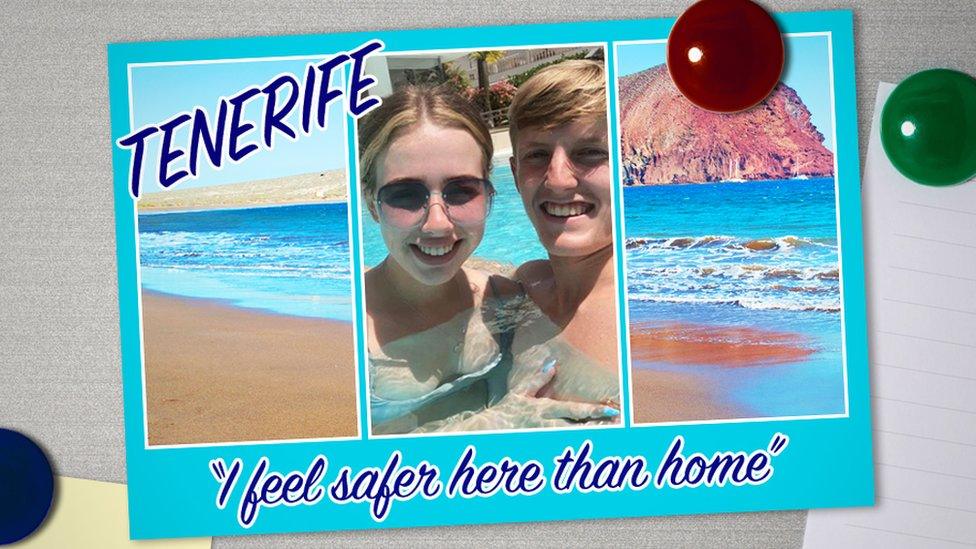
Several plans have fallen through for Grace Wilding so far this summer. The 19-year-old trainee teacher had been looking forward to a big family holiday in a villa in Spain, but they postponed the trip for fears her baby nephew could catch the virus.
Grace and her boyfriend Alfie Archer, 18, had also booked a trip to Cape Verde, but it was cancelled due to the pandemic. The couple didn't want to lose the opportunity to soak up some sun on their first summer holiday together, and they felt that the virus posed a low risk to them as young and healthy people - so they began hunting for a last-minute deal.
"I'd say I feel safer here than home definitely. The same rules are applied but everyone actually follows them here," says Grace from her hotel in Playa de las Americas, Tenerife. The Liverpool Hope University student from Halton, Cheshire, says she was glad to hear flight attendants reminding people to wear face masks on the plane, and that she waited patiently in line for temperature checks at the airport in Tenerife, and happily shared her details with local contact tracers.
In Grace and Alfie's hotel, everyone wears face coverings at all times until they reach their rooms, sun loungers, or dinner tables. "Wearing the masks in the heat can be a bit of a nuisance at times, but this is the climate we've decided to put ourselves in so we will abide by the rules like everyone else," she says.
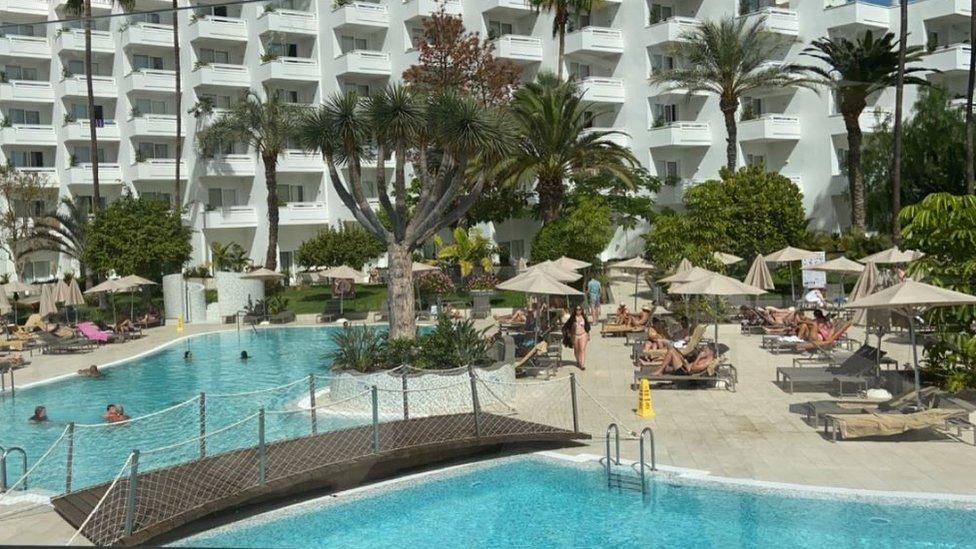
Grace Wilding says everyone's following coronavirus rules at her hotel in Playa de las Americas
In restaurants "you're greeted with hand sanitiser before you sit down", she says. And the couple has mostly steered clear of going to the beach, where officials make people queue up to get a sunbathing spot that's a safe distance from other holidaymakers.
In keeping with the theme of the summer so far, more of Grace's plans were scuppered when the UK's quarantine rules changed for Spain - including the Canary Islands - while they were away. Grace and Alfie are now having to self-isolate for 14 days after returning to the UK.
Grace admits the couple wouldn't have gone to Tenerife if they had known they would have to quarantine when they came back. Alfie worries about the two weeks of income he will lose, because he is a joiner so cannot work while isolating. But Grace remains upbeat. She says the news meant they enjoyed the holiday "probably even more" as they made the most of their last days of relative freedom before flying home.
"I wouldn't hold back on booking another holiday," Grace adds. "The world can't stop for any longer, in my opinion."

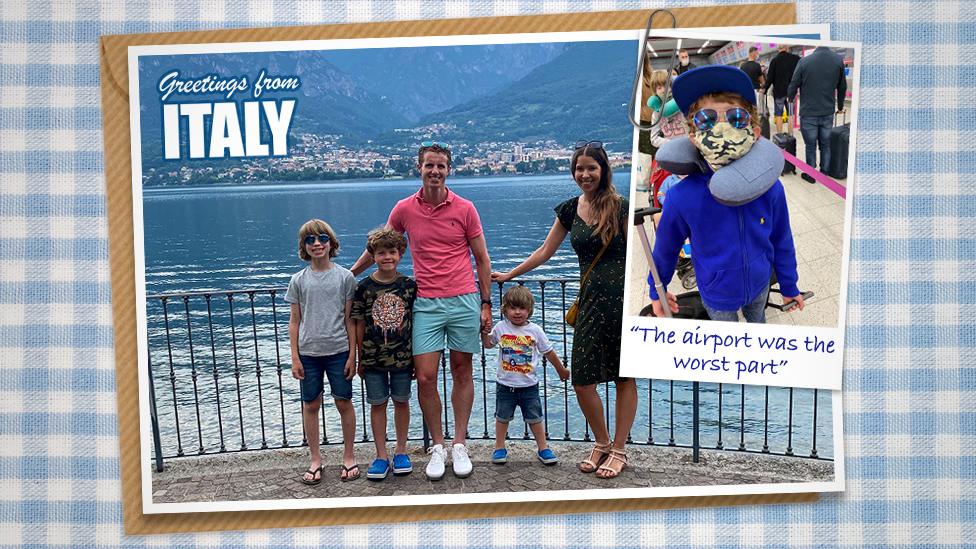
As Ben Osborne describes his family holiday over the phone, his voice is partly drowned out by the sound of his sons shouting and playing at their rented apartment in Lake Como, Italy. "They're having a fantastic time," he laughs.
The family of five, from Hereford, have been to water parks, on day trips, and spent a lot of time at the pool they share with others in the apartment block. Ben, who works for Vodafone as a customer solutions architect, says the pandemic hasn't got in the way of their holiday at all.
They've even taken a mini-break from social distancing. Ben, 39, and his wife Nadia, 37, decided they wouldn't be too strict on their children adhering to Italy's one-metre rule during the 11-day holiday, so they have mixed with other young families staying in the complex.
Ben says this doesn't mean they have completely given up on social distancing and the adults are remaining wary around each other. But he says three-year-old Cooper has "absolutely no concept of staying away from people" and so the rules have also been relaxed for his older brothers Ashton, 10, and Carter, eight.
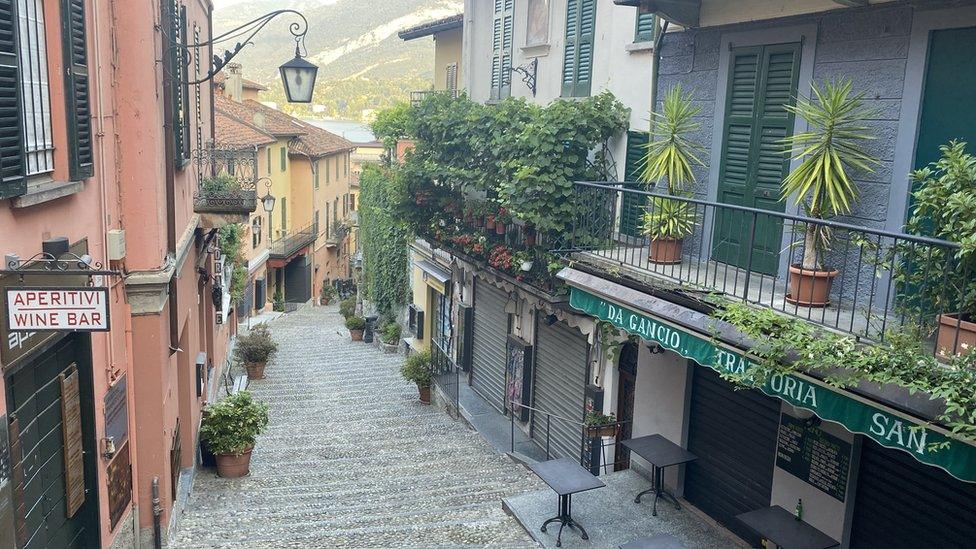
The Osbornes found Lake Como to be much quieter than on their previous trips
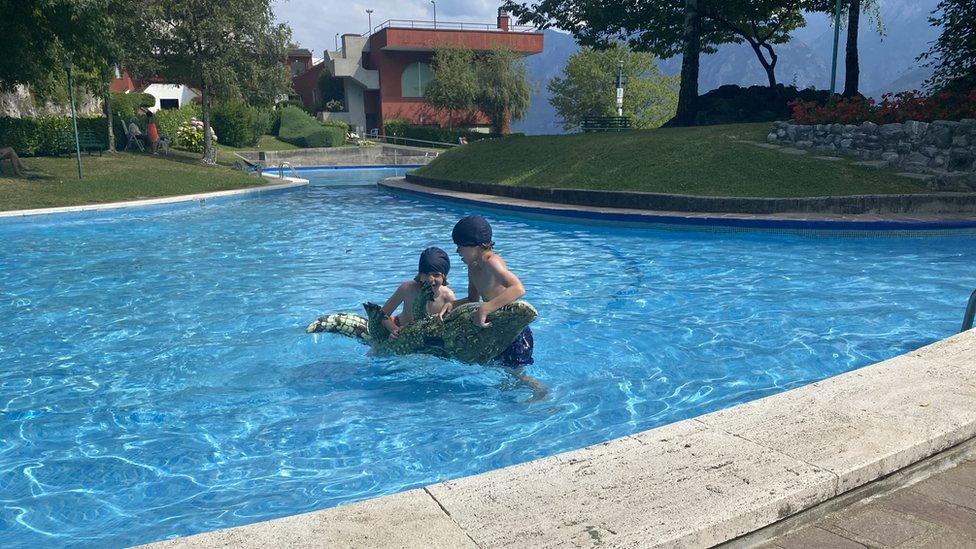
Hygiene rules such as mandatory swimming caps didn't stop Ashton and Carter enjoying the pool
The only time the pandemic brought the mood down was during the Osbornes' journey to their idyllic destination. The worst part was navigating the not-so-idyllic Luton Airport, which Ben describes as a "nightmare". He recalls only one shop was open - Boots - and that it was difficult to find any empty seats in the airport because so many were cordoned off. But the flight itself "wasn't too bad", he says. The family wore face coverings but did have to sit next to strangers, without any social distancing.
The Osbornes have been to Lake Como before, and are enjoying the fact there are far fewer Brits than usual. "We quite like to go away to experience different cultures, [so] what's really nice is I've not heard any English language," Ben says.
He adds that it's a blessing to not have to queue for the supermarket, as we have grown used to in the UK. The only visible signs of the virus, to Ben, were people wearing face coverings in shops, and mandatory swimming caps in the pool. "If someone had plonked us here and we didn't know about coronavirus, we wouldn't know the difference. You honestly wouldn't know that there's a pandemic."

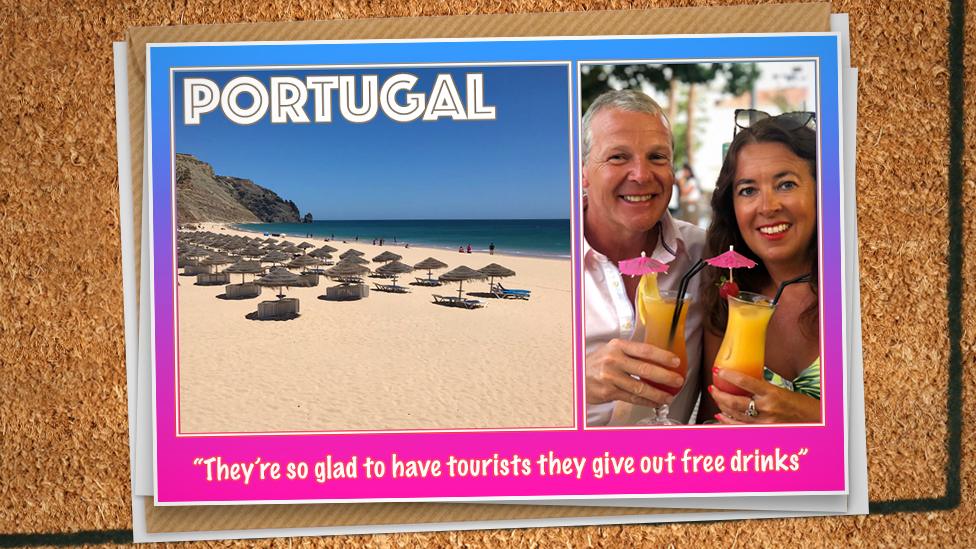
Julie Grinter's friends told her she was "completely mad" for deciding to go ahead with her three-week holiday to Portugal, after the country failed to make it on to the UK government's quarantine-free list. But Julie, 50, points out that you could catch coronavirus in the supermarket at home, let alone on a plane. "You can't stay inside for the rest of your life so you've got to take the precautions and get on with life," she says.
The choice of destination might have horrified Julie's friends, but she and her partner Matthew Boulden, 52, felt extremely safe. After flying to Lisbon they went on a road trip to the Algarve and enjoyed being almost the only tourists, wherever they went. "It's just absolutely deserted. There's just nobody there," says Julie, who works for a consultancy firm in the City of London.
The couple ate out regularly, and while most dining was outside to help reduce the spread of the virus, Julie points out that the Portuguese climate meant that was never a problem. Impeccable service, high hygiene standards, free drinks from grateful waiters, and chats with less-than-busy chefs all added to the couple's feeling that they'd stumbled into a luxurious private dining experience.
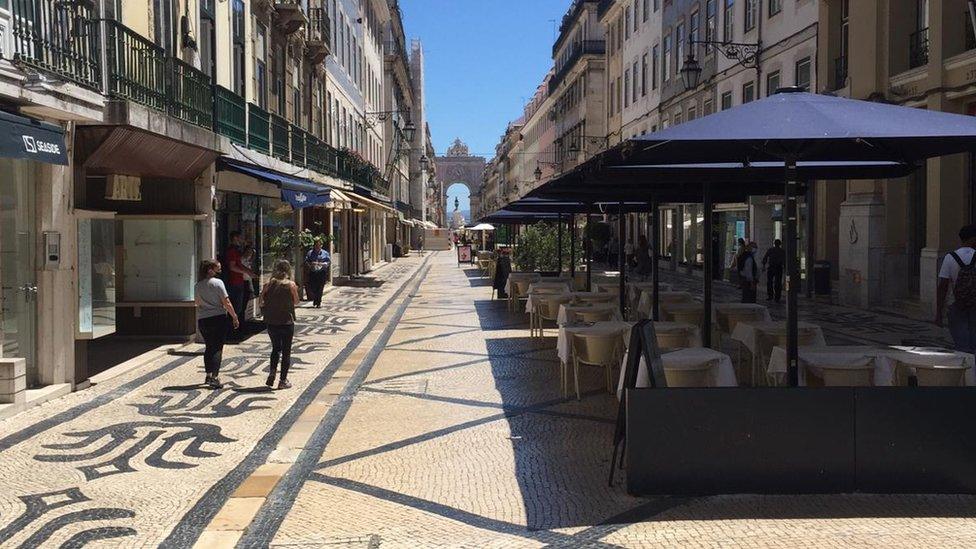
Restaurants owners on Julie's road trip told her they were struggling with a lack of customers
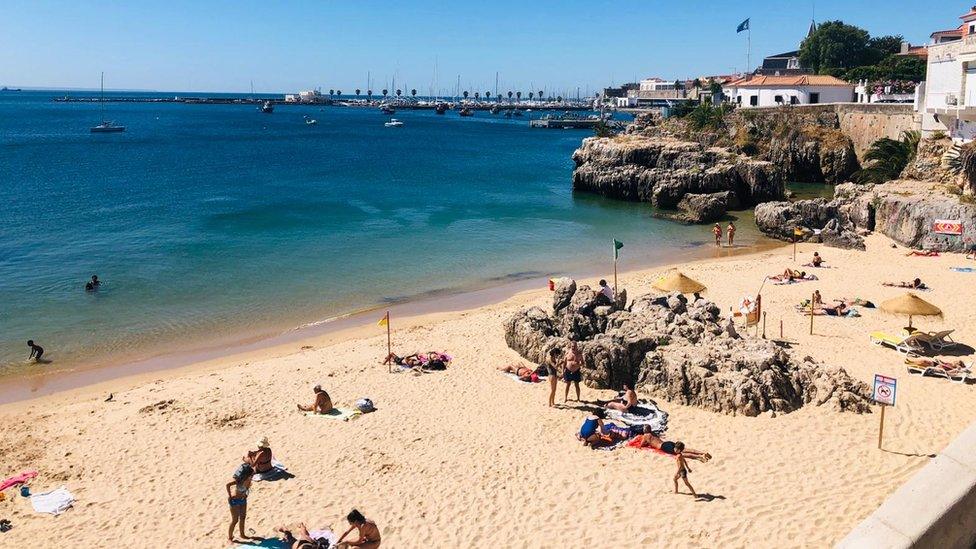
Julie, who says many beaches were deserted, took this photo of the popular Praia da Rainha in Cascais
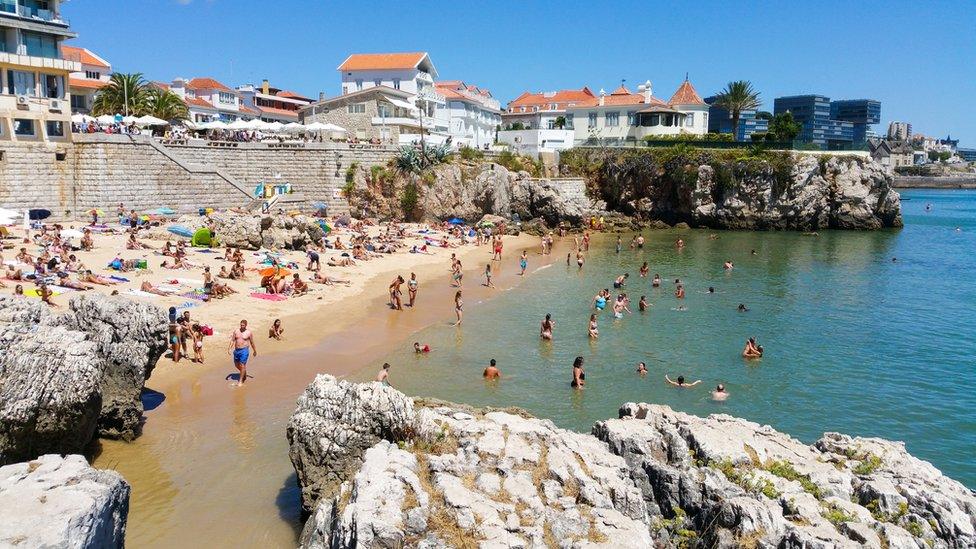
Crowds at Praia da Rainha in Cascais, in the pre-coronavirus world of August 2016
But Julie from Surbiton, south-west London, admits the solitude wasn't always a relief. Tourism is a major industry in Portugal and is popular with British holidaymakers, with almost three million UK visitors a year. The restaurants often lacked "a bit of atmosphere", she says, adding that the staff were anxious for the future, and owners were "hacked off" and "obviously devastated" that their country still has not made it on to the UK's quarantine-free lists. "You do feel massively sorry for them because they are just desperate for business," she says.
Portugal's border is open to British citizens, but the UK government advises against travel to most parts unless the trip is essential, external. On arrival to the mainland, travellers have to do a health screening, and those going to Madeira, Porto Santo or the Azores must take a coronavirus test on arrival or before travelling.
Cheap flights, deserted beaches and a free cocktail or two mean now that Julie is home, she's spending her 14 days of isolation persuading her previously horrified friends that Portugal is the place to be in a pandemic. "If you can just work from home when you get back, it's ideal."

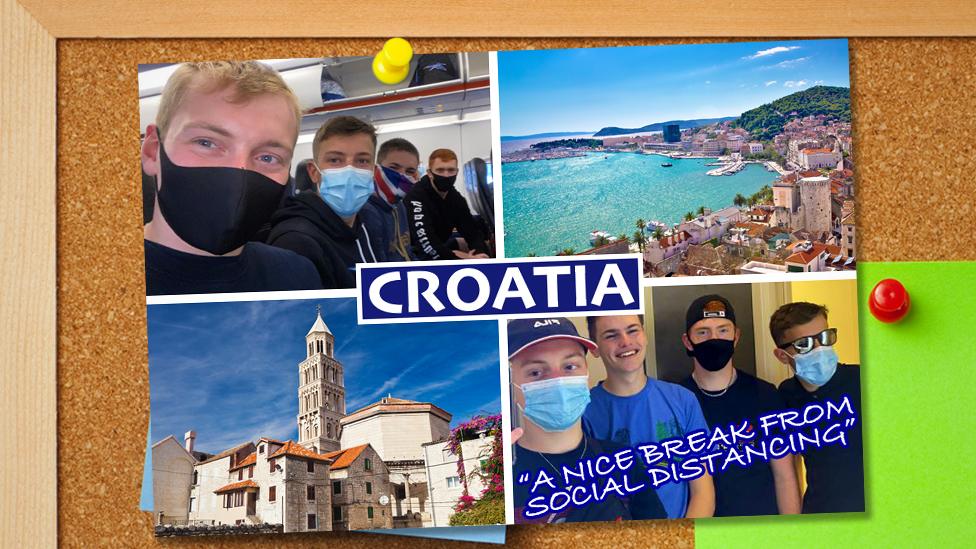
For Adam Welch, a self-imposed month of minimal social contact at home in Kirkham, Lancashire, is the price he's paying for a five-night getaway to Croatia.
The 18-year-old and three friends have formed a temporary household bubble at an Airbnb in Split. In order to reduce the chance of spreading the virus to one another, or to anyone else on their return to the UK, the friends agreed to minimise their social contact with anyone for 14 days before going away and 14 days after getting back. "I just think it comes down to thinking of other people," Adam says.
The pandemic led to exams and celebrations being cancelled in Adam's final year of college, so the sacrifice of semi-quarantine will be worth it to "let my hair down" on holiday, he says. "If someone said to me at the start of the year, 'if you go on holiday you have to isolate for 14 days afterwards in your house', I'd be like: 'no way. I can't do that, it sounds so hard'. But now it just sounds easy."
So far in Split, the four friends have enjoyed eating out, going out for drinks, exploring the city, and snorkelling off picture-perfect beaches. People have to wear masks in shops and on public transport in Croatia but locals aren't observing social distancing at all, Adam says. While it's weird to see, he adds, it's a nice break from the rules and regulations in place in the UK.
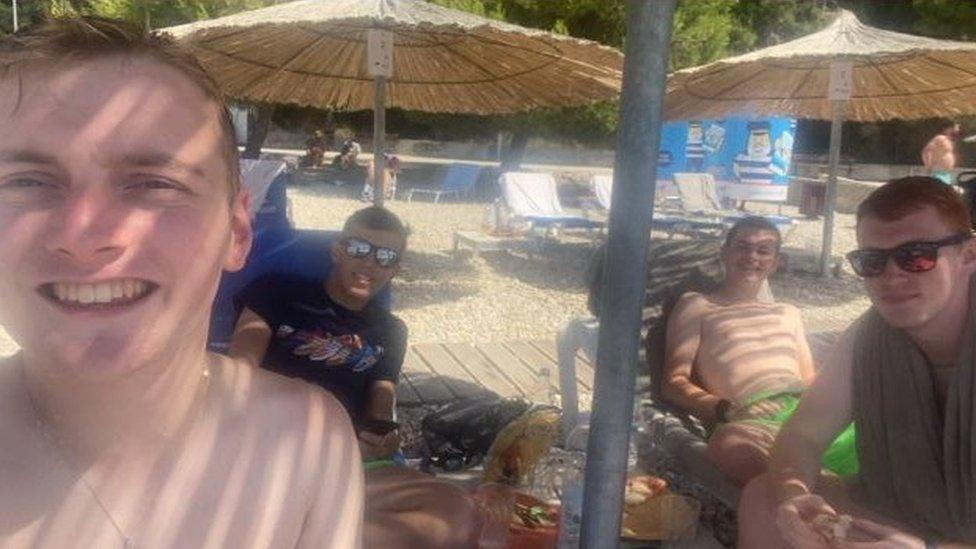
Adam Welch says he's happy to give up Croatia's nightclubs in favour of its beaches
In the hiatus between finishing college and starting university in York in September, Adam admits he's tempted by Croatia's nightclubs, which are open albeit with some additional cleaning measures to combat the spread of the virus. But Adam says the "lads' holiday" will be a more muted affair than it would have been in normal times. "At the end of the day, we're in a nice apartment, we can just get some drinks from a shop and stuff like that, and chill out with each other. We can definitely have a really good time and we don't have to go clubbing."
England, external, Wales, external, Northern Ireland, external and Scotland, external have separate, albeit similar, lists of destinations that are exempt from the quarantine rule.
For some of the most popular warm weather hotspots among Brits, we've got more details of what to expect when you're there.
Images subject to copyright

'GUIDED BY SCIENCE': A dangerous gamble with people’s lives or a sound scientific approach?
I MAY DESTROY YOU: The groundbreaking drama making headlines in lockdown

- Published27 August 2020
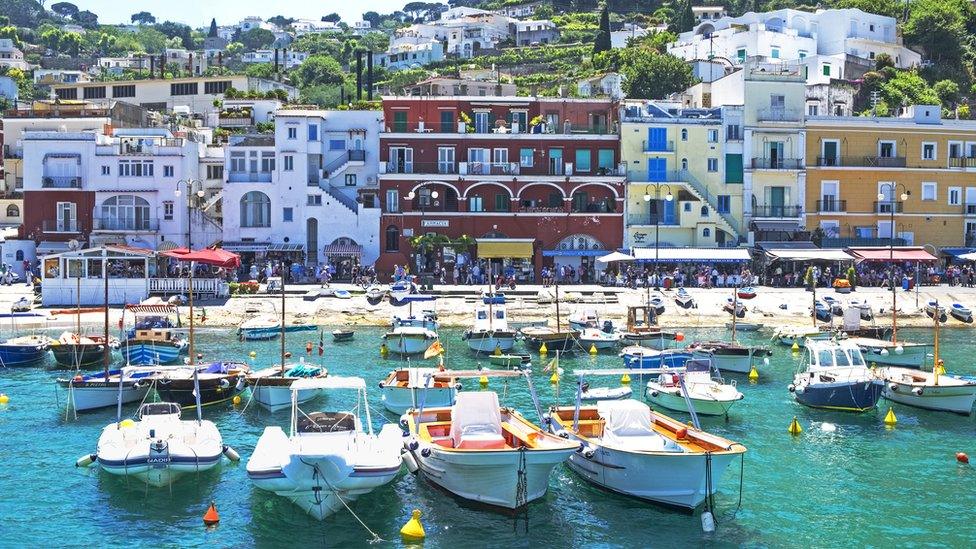
- Published29 November 2021
